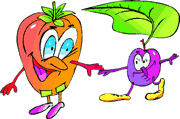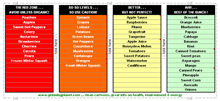|
At Grinning Planet, we think the high level of toxic pesticides used to grow most of the world's food is probably the worst idea man ever came up with. Well, maybe second worst, after reality TV shows like "Survivor: Twelve Angry People with Machetes." Consumers are quickly recognizing that the residual levels of pesticides in food—especially pesticide residues in non-organic food—are contributing to the chemical "body burden" in all of us.
 Chemical effects in the human body are worth worrying about, especially when it comes to kids, who are more affected than adults. To that end, we think pesticides in food are worth avoiding as much as possible.
Chemical effects in the human body are worth worrying about, especially when it comes to kids, who are more affected than adults. To that end, we think pesticides in food are worth avoiding as much as possible.
By now, most people understand that buying organic food is a great way to reduce one's exposure to pesticides in food. But that avenue may not be possible for everyone or in every food choice. Perhaps you can't always afford the extra cost often associated with organic food, and organic fruits and vegetables may sometimes be unavailable in your grocery store.
There is a good compromise solution! Today's article tells you how to minimize your exposure to pesticides in food without going fully organic—by making smart food choices based on which fruits and vegetables have the highest and lowest levels of pesticide residue.
Before we get to the good stuff—the list of foods with the most and least pesticide residue—here's a quick recap of some of the harmful things pesticides can do to us humans:
- cause low birth weight and birth defects;
- interfere with child development and cognitive ability;
- cause neurological problems;
- disrupt hormone function;
- cause a variety of cancers, including leukemia, kidney cancer, brain cancer, and non-Hodgkin's lymphoma.
Children and fetuses suffer more of these effects from pesticides than do adults because children's bodily systems are still developing. Additionally, children are much less able than adults to detoxify most pesticides. Pesticide effects in the unborn and in infants can have lifelong effects. For instance, the risk of neurological or behavioral problems following early pesticide exposure extends through puberty, as the reproductive system, nervous system, and brain continue to grow.
It's also worth noting that farm workers suffer more than their share of bad pesticide effects; and birds, beneficial insects, and other wild critters are impacted, too.
Pesticide exposure can occur through means other than food intake, but research shows that reducing pesticide intake via food has an immediate observable effect on body-burden levels of pesticides. So, when in the produce aisle, pick organic when you can, and when you can't, try to avoid foods with high pesticide residues and substitute those with low pesticide residues. The next section explains how to do that.
So, what fruits and veggies are best and worst when it comes to pesticide residues? We present a summary of pesticides-in-food data below. The main source is research conducted by the Environmental Working Group (EWG), but we have augmented those results with additional information from analyses performed by Charles M. Benbrook, PhD, an agricultural specialist, and by Consumers Union. There are four categories, ordered left to right from worst to best.
THE RED ZONE . . .
AVOID UNLESS ORGANIC! |
| Peaches |
| Apples |
| Sweet Bell Peppers |
| Celery |
| Nectarines |
| Strawberries |
| Cherries |
| Carrots |
| Pears |
| Frozen Winter Squash |
| |
|
|
SO-SO LEVELS . . .
SO USE CAUTION! |
| Spinach |
| Grapes |
| Lettuce |
| Potatoes |
| Green Beans |
| Hot Peppers |
| Cucumbers |
| Mushrooms |
| Cantaloupe |
| Oranges |
| Fresh Winter Squash |
| |
|
|
BETTER . . .
BUT NOT PERFECT! |
| Apple Sauce |
| Raspberries |
| Plums |
| Grapefruit |
| Tangerine |
| Apple Juice |
| Honeydew Melon |
| Tomatoes |
| Sweet Potatoes |
| Watermelon |
| Cauliflower |
| |
|
|
AHH . . .
BEST OF
THE BUNCH |
| Broccoli |
| Orange Juice |
| Blueberries |
| Papaya |
| Cabbage |
| Bananas |
| Kiwi |
| Canned Tomatoes |
| Sweet Peas |
| Asparagus |
| Mango |
| Canned Pears |
| Pineapple |
| Sweet Corn |
| Avocado |
| Onions |
| |
|
Click here to open a wallet-sized PDF or Excel version of this table.
The closer to the left a food item is on the chart, the harder you should try to buy only organic for that item. In particular, avoid non-organic purchases from the red and orange columns, especially the red. Even the foods listed in the green column were not always found to be pesticide-free, but they were consistently low in pesticide residues and are your best bets for non-organic food. An EWG simulation showed that people can lower their pesticide exposure 90% by avoiding the most contaminated fruits and vegetables.
It may be tempting to think you can "beat the list" by extra washing and peeling, but the fruits and vegetables listed above were tested as they would be eaten by a consumer. For instance, bananas were peeled before testing and apples were washed before testing.
Additionally, some pesticides are taken up internally by the plants and find their way into in the parts of the plant you eat; thus, the pesticides cannot be washed off. Other pesticides are designed to bind tightly to the surface of the fruit or vegetable so rain doesn't wash them off, which means you cannot easily wash them off either. Peeling does reduce exposure to surface-level pesticides for many of these foods, but you often lose valuable nutrients and roughage when you throw away the peel. And anyway, how are you going to peel spinach or a strawberry?
|
It's also important to remember that the best-to-worst list applies not only to fresh fruits and vegetables but often to the same items when they are in canned or frozen form, as well as to processed foods and restaurant meals that contain those particular fruits or vegetables. It is worth noting, though, that the Benbrook study found less contamination in processed food than fresh food; but you'll loose valuable vitamins, enzymes, antioxidants, and other phytonutrients if you decide to avoid fresh food. (You may want to see our article on the nutritional differences between Living Food and Dead Food.)
|
|
PICKY, PICKY |
|
You'll note that fruits dominate the list of foods with the most pesticide residue. The main reason for this is that consumers have become very, very picky about fresh produce, and growers have discovered that, from an economic standpoint, it makes sense to douse everything with toxic chemicals so the fruits are completely blemish-free. But now that you know the dirty little secret about the pesticide residue in those "perfect" fruits, does it really make sense to put a higher priority on food beauty than on food safety?
Moreover, organic growers have come a long way since the early days (a few decades ago) and now routinely deliver excellent-quality produce, both in terms of appearance and taste. In fact, most people find that organic fruits taste better than conventionally grown fruits, and research has shown that organic fruits and vegetables are often higher in antioxidants. (See our article on Organic Food Myths ... and Realities.)
|
|
Benbrook also noted that "IPM" and "No Detectible Residue" labeled produce had slightly less pesticide residue than conventional produce but far more than organic produce. And in case you're wondering why there should be even a low level of pesticide residue in some organic food—it's because of groundwater contamination and pesticide drift from neighboring farm fields, and from prior soil contamination with now-banned but still-present persistent organic pollutants (such as DDT). Steps are taken by organic farmers to minimize such contamination, but it's not a perfect world.
Some people have really good memories, but we at Grinning Planet found that trying to memorize the pesticides-in-food table was about as feasible as our last New Year's resolution to read more dictionaries. So we created a handy wallet-sized version—see below.
| How to Get the Wallet-Sized Pesticides-in-Produce Guide |
|
 There are two ways to download and print the wallet guide.
There are two ways to download and print the wallet guide.
Approach 1: Click either of the following links:
- PDF version;
- Excel version.
These files should open in the Adobe Acrobat Reader or Microsoft Excel plug-ins associated with your web browser. You should then be able to print the guide on your local printer, perfectly sized.
If you need to install the Acrobat plug-in, you can do so for free from the
Adobe web site.
Approach 2: Do right-click/"Save Target As" on either of the following links to save the
PDF file or
Excel file
to your hard drive. (Make sure you know where on your hard drive you're putting the file. The Desktop is always a good idea.) Then double-click the file and print it.
To use Approach 2, you must have the right application (Adobe Acrobat Reader or Microsoft Excel) installed on your computer. If you need to install the Acrobat Reader program, you can do so for free from the
Adobe web site.
If you don't have Microsoft Excel, you can download and install the free "Excel Viewer" program from the
Microsoft web site.
|
The "What's On My Food" site is also helpful, and they have an iPhone app to let you peruse data while you're at the market.
Know someone who might find this Pesticides in Food article helpful? Please forward it to them.
|
Resources:
Books, other articles, and resources:
|
|
Get Grinning Planet free via email
|


